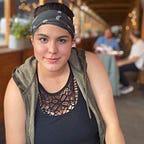Dry Brine.
Whenever I am invited to a party, — especially if I am not close to the host or many of the expected attendees — I bring ingredients and spend my first hour in the kitchen, assembling something for guests to eat.
I wish I could tell you that this impulse comes from a lifelong talent and passion for food, but the truth is far less cute: Group social events incite schoolyard fears in me, so I prefer to have a self-assigned task to focus my nervous energy.
Thankfully, I am a halfway decent cook, and my standby recipes tend to secure my invitation to future events. I feel like I have contributed something while also cleverly avoiding the crowd (and the feeling of being the last one picked for the group project that is an unstructured social gathering).
Considering my marked propensity towards hiding in the kitchen, it should come as no surprise that my skill set truly shines at Thanksgiving. After all, there is a designated activity, and that activity is eating large quantities of food (and, for some, getting daydrunk while preparing said food).
My adolescence and young adult life have been spent grappling with which leftovers from my upbringing are worth storing in the refrigerator of traditions (does this metaphor work?).
After all, Thanksgiving’s endurance in American culture is a blatant reminder of the permanent red-wine stain of colonialism and genocide of Indigenous peoples. The centering of whiteness isn’t a symbol of America’s decomposition; the centering of whiteness was and is a stronghold of America’s composition from its inception.
Why celebrate Thanksgiving?
I mean, I don’t have the “Family tradition” excuse. I haven’t gone “Home” to some house filled with my biological extended family for Thanksgiving since I was sixteen years old…And I’m pretty sure one of my uncles slipped me a Klonopin at that one, because I was visibly miserable. It helped, at least!
Being a queer person from a relatively emotionally disconnected family always gives me a sense of sadness around the holidays. Every November and December, I give myself space to grieve the loss of the potential “Normal” life and family dynamic that I never got to fully experience.
But this grief is over a lost possibility, not a tangible thing I ever had that somehow was taken from me.
Thankfully, that means I have always had the opportunity to create something brand new, to start from scratch, to build from the ground-up.
Once I could finally choose where I lived, Thanksgiving became a reclamation, a rebellion, a liberal appropriation of the oppressive ritual. The only surefire commonalities between all my Thanksgivings were the rituals of carbs and gratitude on a Thursday in November. Everything else was a middle finger to the traditions of colonialism, stereotypical family, and unimaginative cold-weather holidays.
One year was spent stoned at a college dining hall in San Francisco, another at a professor’s house in Oakland, surrounded by queer sex educators. I’ve spent Thanksgivings with longtime partners, posses of queer people, recent exes, total strangers, lifelong friends, partners’ families, roommates, and even short-lived flings.
We came together at antique tables in Bay Area cottages, scattered on living-room floors in Queens, in painfully modern restaurants in Manhattan, and even saving a seat for a dog in an apartment in Sacramento.
Sometimes we ate turkey. Sometimes we didn’t. Over the years, I’ve had vegan fare, Greek food, gumbo, Chamorro food, homemade donuts, and God knows whatever else I could fill myself with until I absolutely needed to lie down.
Magically, during my adult Thanksgivings, I was never the only queer person in the room. I was never scrutinized for being different, liberal, heavy, or young. I was never auditioning for the approval of the room. I was never trying to appease or escape from White Cishet Boomers.
I am steeling myself for what this Thanksgiving means.
First of all, if you’re traveling to a gathering for some traditional Thanksgiving with your relatives this year when you could be contributing to the spread of a pandemic, you truly must be stunned into obsolescence by your own whiteness and lack of cultural context.
Secondly, this Thanksgiving marks a loss within my chosen family; someone I have spent many Thanksgivings with is now no longer someone I can cohabitate with or trust because of said carelessness surrounding the pandemic.
Spending Thanksgiving alone is the responsible choice. It is the moral choice. It is the only choice. I’m lucky to have a home and access to food at all.
If there’s no party full of people to avoid and then feed, I don’t know if I’m going to spend that Thursday in November in my kitchen.
Maybe, like every other tradition upended by quarantine, I can pivot to video and allow for my friends to consume my Thanksgiving visually rather than the old-fashioned edible way.
Maybe I’ll cook ahead of time and pack pre-portioned meals into a Friendly Fridge in my neighborhood.
Maybe this level of unknown is a messy way to end an essay, but this level of unknown is how we’re ending this messy year.
It’s going to take time for everything that has been packed upon us this year to take effect. We have been impacted from the outside-in, and the changes will continue to show with time.
Every speck of salt layered onto our fragile skin will be absorbed, simultaneously draining us and allowing for us to develop the tenderness that can only come about in this environment. It is time-consuming and inconvenient, but I have to believe it will be worth it.
